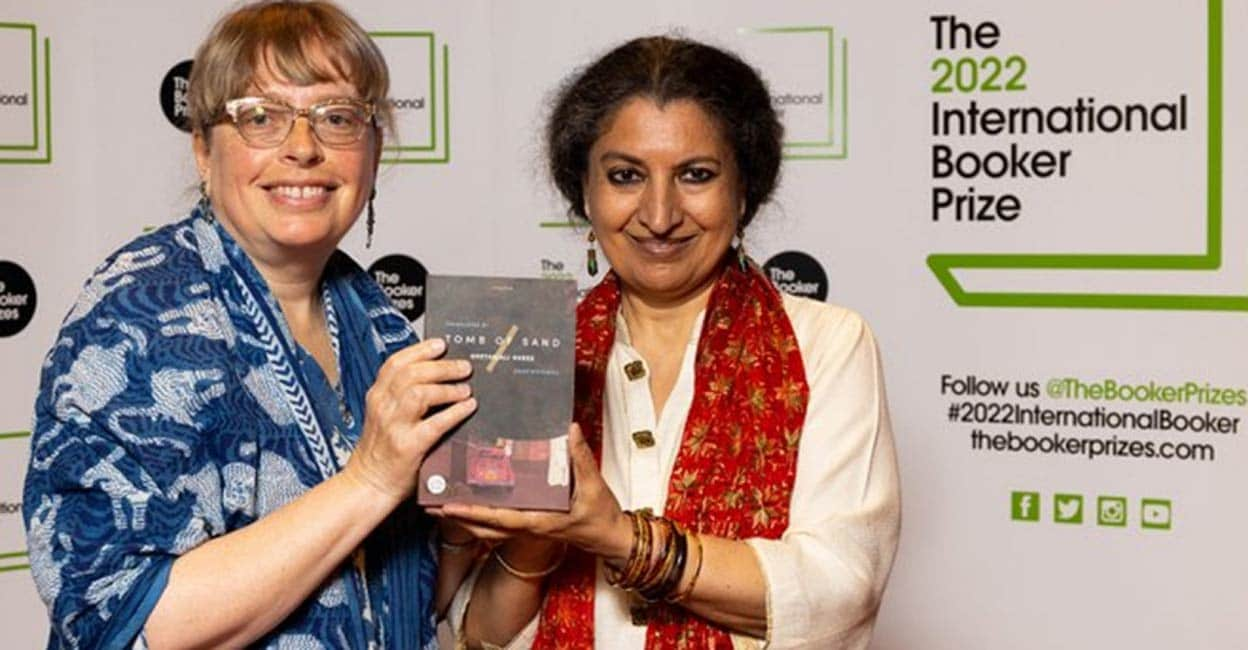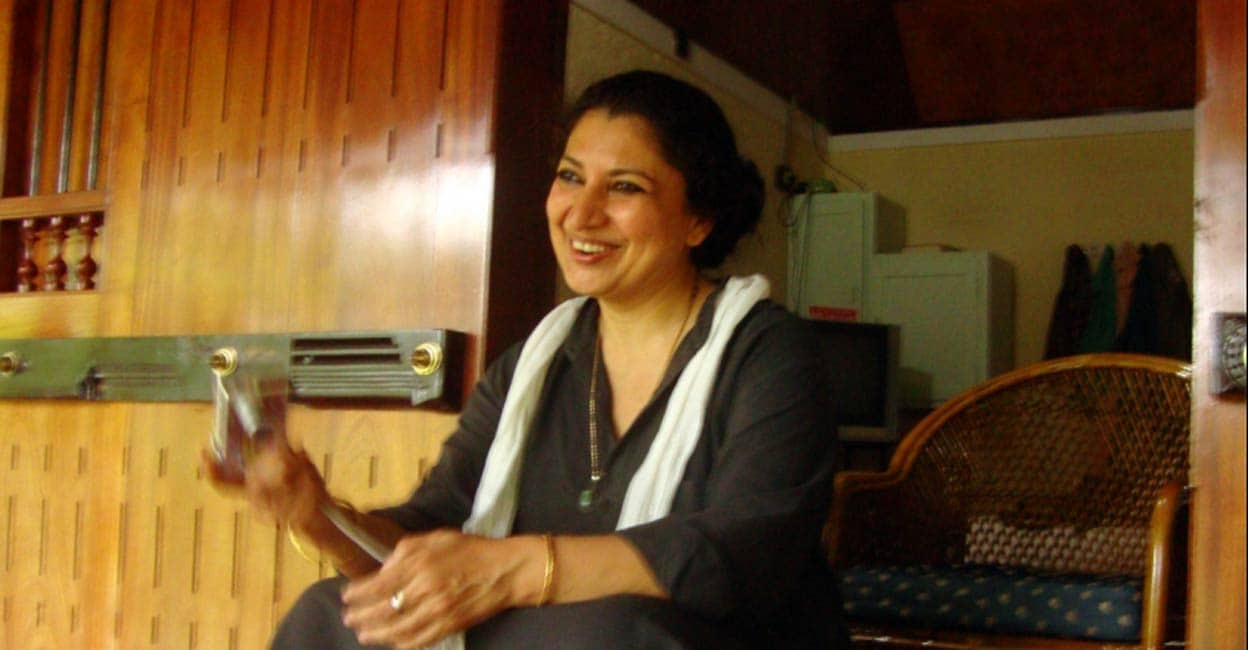Geetanjali Shree's 'Tomb of Sand' is just right for our times | Book Review

Mail This Article
Book: Tomb of Sand
Author: Geetanjali Shree
Translated from Hindi by Daisy Rockwell
Pages: 725
Price: Rs 699
Geetanjali Shree’s novel, Tomb of Sand, a work in Hindi, translated very well by Daisy Rockwell, last week won the International Booker.
The award committee praised it: ‘Rather than respond to tragedy with seriousness, Geetanjali Shree's playful tone and exuberant wordplay results in a book that is engaging, funny, and utterly original…’ And at the same time, ‘an urgent and timely protest against the destructive impact of borders and boundaries, whether between religions, countries, or genders.’
Without taking names, we can assume the judges are Good People who wish the very best to humanity and insist on inclusivity and diversity. An award for literature with good intentions. A political award, in short, handed out to a benign political novel. A correct exercise.
Tomb of Sand houses many good people. The source of the goodness of humanity in the world of the novel comes from the warm, hopeful, radiant personality of the author. And she is adept at measuring out the chaos in a novel that has no quotation marks and revels in fluid transitions between points of view. Years ago in the context of another novel, Shree wrote: ‘Confusion. Really that’s all I can write about. That’s all I am, we are, at that moment. A moment perhaps so fraught, so overwhelming, that the distance between thought and feeling shrinks, maybe vanishes. If literature is about subtlety, understatement, deflections, and detached observation, then can there be literature at such a moment? When the ‘outside’ turns so invasive that it is as if no ‘inside’, space remains for the writer?’
In the present novel, written after nearly 20 years after her words above, the chaos has only further deepened both internally and externally. And so, this novel, too, certainly does not go overboard on subtlety, understatement, or detachment. The ‘outside’ has proven to be ever more intrusive. More borders have emerged. More barriers. More divisions. More groups. More rights. More of less even.
Shree’s well-intentioned novel is a great and sustained effort in erasing divisions and advocating a humanism, independent of the state apparatuses. Indeed, Shree displays a disarming distrust of governments and their insistence on lifeless documents, always a means to control: passport, visa, marriage certificates. Instead, as a writer and a thinking person, Shree invests faith in individual relationships. In words to that effect, EM Foster said, if it came to it, he would prefer a friend to a nation. Nevertheless, this guiding notion of Shree that there is a whole, different world out there, awaiting discovery, if only we were good humans to each other, is an exercise in wishful thinking, of course. An exhausted vein.
The novel strains toward this unreal world which was presumably breathing glory in some distant past; more specifically before the line was drawn between India and Pakistan. The future that the novel aspires to in the bubbly and mischievous character of Ma, then, is the idyllic past when life was defined by feelings, not by ideology or identity politics. In this respect, the novel, as many seem to vicariously celebrate as an endorsement of feminism, is not feminist at all. It is a celebration of the exuberant, paper-less life of individualism. Ma is nothing if not a romantic individualist.

Tomb of Sand centers around — in as much as the chaotic universe of the novel has a center at all — the 80-year-old Chanda, who has lost her husband (on page 1) and is in mourning, a kind of bedridden samadhi, from which she wakes and sits up -- on page 144. I mention the page numbers to show how very leisurely the novel’s progress is. If this book has not won a major prize, I doubt very much it would not be damned by its excesses.
On the other hand, when a book is honored with an award like the Booker, we are forced to rethink if the flaws in it are actually strengths. The unending monologues of the characters, (attributed to them by the relentless untiringly indulgent and omniscient author) are often circular and as often pointless in their irritable piling up of details. Perhaps, that is an indication of the chaos we live and die in, the endless possibilities we cannot ever know because we cannot live them all except in obsessive internal talks.
The author’s omniscience spares nothing. She is privy to the innermost feelings of walls, doors, walking sticks, and crows. Her intimacy with people, animals, and objects is unapologetic, and the resultant logorrhea is celebratory, but not necessarily funny. In chapter 62, the author mentions Borges in passing — on how similar stories are to dreams. I thought the mention ironic because Borges compressed into his short stories whole novels.
At the same time, there is a Tolstoy-like ruthless streak in Shree in dismissing a character that may threaten to take over the mainline of the plot. Rosie the Hijra is one such. Just as we weigh anchor with Rosie, we get the telegram in two words in a cryptic chapter (74) wholly devoted to her: ‘Rosie died.’ The death of Rosie summed up and dismissed in two words is pretty much the hook point of the plot. Only we are almost hovering on the 500th page. Shree takes her time to get you to the real thing.
From here on, after Rosie’s death, events take on a definite momentum, and a direction: Pakistan, where Chanda (‘Ma’) heads for in the company of her liberated/feminist daughter, Beti, who learns more of what really liberation and feminism means as she is pitchforked into her mother’s past in an enemy country, which was once friendly, because it did not exist because there was no border because it was all India. It is a kind of colonialism in reverse, but never mind: Tomb of Sand is still the nearest that the Indo-Pak People to People exchange program has come to their favourite nostalgia moment, a return to a people in a time and place before the Partition.
There are many virtues to the book. It does not judge. It does not condemn. It does not sentimentalize. It is wise. And it does not care if the reader is bored -- which he often is. Indeed, its very great strength is the risk it is willing to take in paying the least attention to the western idea of the structured novel.
In an interview now dug up and doing the rounds, Shree says: “Perhaps some essence of what I am saying can be captured by a walk down almost any street in India. An urban Indian street where the village and the town, and the East and the West, and animals — from the two-legged to the many-legged kind — mingle and jostle…
‘What is the writer without solitude? I don’t know. I can’t judge, … there is no one kind of literature alone, the canvas of literature accommodates many modes, many transgressions, and different times and different compulsions strain at the borders of different literary maps, reshaping them if need be.

‘I wrote this in 2003. Mulling over the anxieties of being a writer in a time when the environment loomed large and overbearing on almost every moment of our lives. Since then, that intrusion and pressure have only worsened. The overlapping of the private and public, and the personal and political, oppresses an even larger part of the world today. How do we negotiate is the question.’’
This is a deeply thinking, fiercely intelligent writer. And one who is disturbed by the course of the events. That the ship has further steered off the compass is pretty much in evidence all around us. This book tries passionately to steer her back to the chart. But does the effort deserve a Booker? Well, what’s a Booker but a manifestation of the institutional sensibility of our times? In that sense Tomb of Sand is correct and reconciliatory literature. Just right for our times. And for no other.


